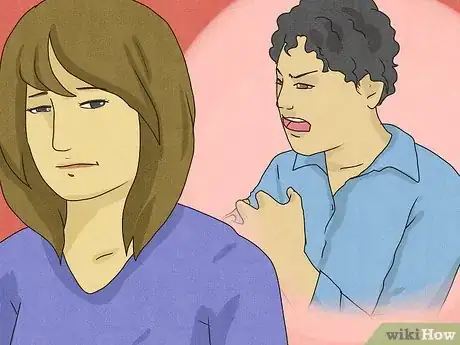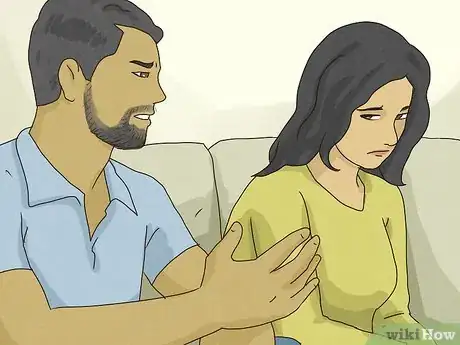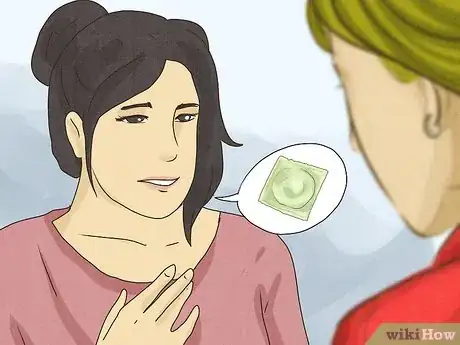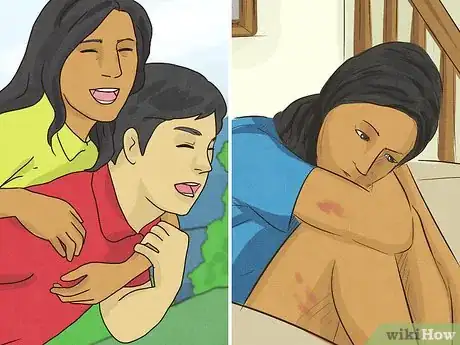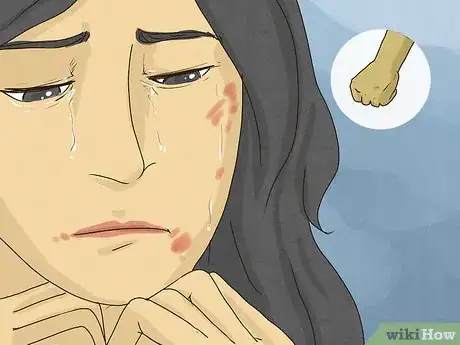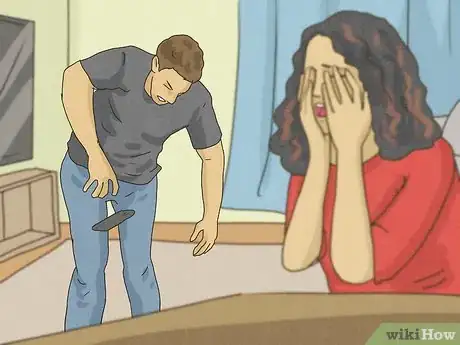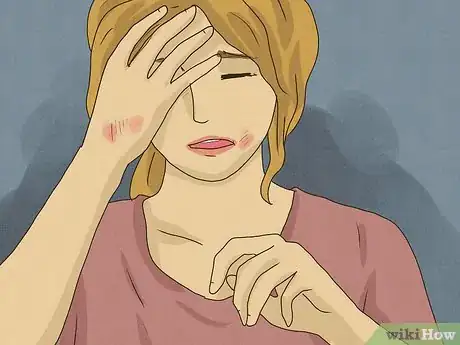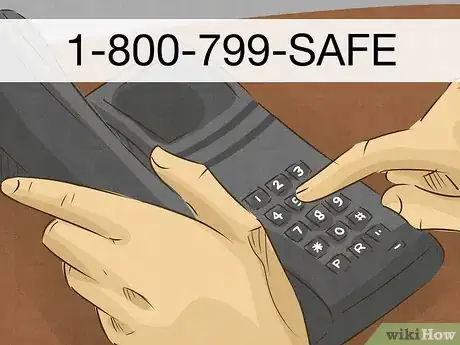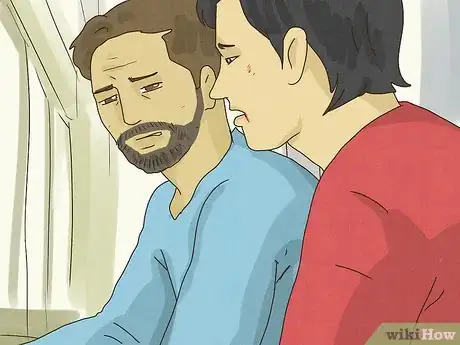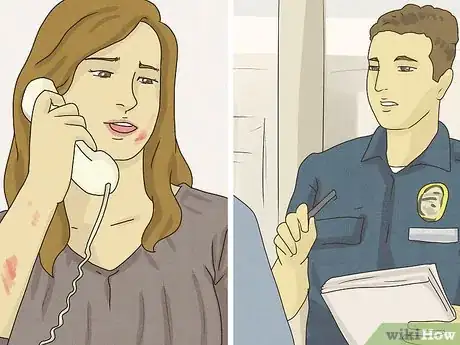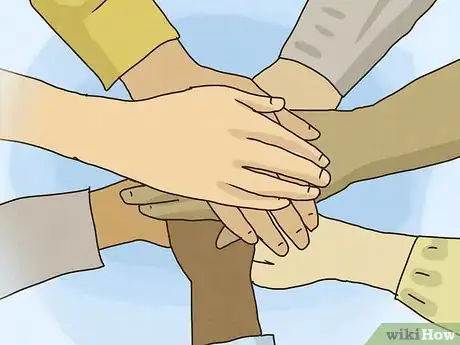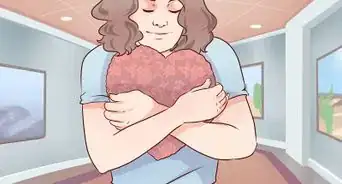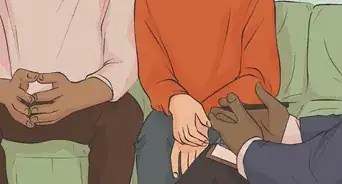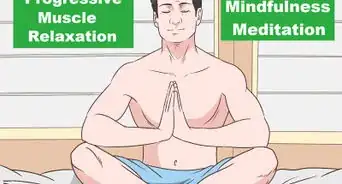This article was co-authored by Jay Reid, LPCC. Jay Reid is a Licensed Professional Clinical Counselor (LPCC) in private practice in San Francisco, CA. He specializes in helping clients who have survived a narcissistic parent or partner. Treatment focuses upon helping clients identify and challenge self-diminishing beliefs as a result of narcissistic abuse. Jay holds a BA in Psychology from the University of Pennsylvania and an MS in Clinical Psychology from Penn State University.
There are 24 references cited in this article, which can be found at the bottom of the page.
wikiHow marks an article as reader-approved once it receives enough positive feedback. In this case, 83% of readers who voted found the article helpful, earning it our reader-approved status.
This article has been viewed 131,444 times.
Sometimes, it can be hard to tell the difference between when someone you love is having a bad day and when they are being abusive. 57% of college students say they aren't sure how to identify relationship abuse.[1] Abuse can come in many forms, and is more than just physical violence. Emotional abuse, psychological abuse, and verbal abuse are all forms of abuse too. Abusive people try to control you by using threats, coercion, manipulation, and other tactics. Healthy relationships involve mutual trust, respect, acceptance, and allowing the other person to be him or herself. Whether you consider yourself gay, straight, bisexual, or something else, it's possible to be in an abusive relationship. If you're worried that your relationship is unhealthy or that your boyfriend is being abusive, read on to learn the signs and what you can do to keep yourself healthy and happy.
Steps
Recognizing Emotional and Psychological Abuse
-
1Look for controlling behavior. Controlling behavior may seem “normal” to you, but it is a form of abuse.[2] Your boyfriend may say that he wants to know what you are doing all the time because he cares so much about you, but true caring involves trust. These are all signs of controlling behavior:[3] [4]
- Demanding that you constantly check-in with him, even when it's unreasonable or inconvenient
- Wanting to know everything you're doing
- Refusing to let you hang out with people unless he's there
- Monitoring your phone, internet, or social media use
- Expressing unhappiness that you spend time with people other than him
- Demanding to check your texts or other messages
- Asking for your account passwords
- Trying to control how you dress, where you go, what you say, etc.
-
2Think about how you feel around him. It can sometimes be hard to identify a relationship as abusive, especially if what you think of as “abuse” (usually, physical violence) hasn't happened yet. However, considering how your boyfriend makes you feel can help you determine whether you're in a healthy relationship. You may feel like something is “off,” or like you are “walking on eggshells” and don't know what will set him off. You may feel constantly blamed for the problems in the relationship.[5] Consider the following questions:
- Do you feel accepted for who you are, or do you feel constant pressure to change?
- Do you feel embarrassed or humiliated around your boyfriend?
- Does your boyfriend make you feel guilty for his feelings or actions?
- Do you feel bad about yourself around your boyfriend?
- Do you feel like you need to “love” your boyfriend into changing?
- Do you feel exhausted or tired all the time when you interact with him?
Advertisement -
3Consider how he talks to you. We all say things that we regret. Even in healthy relationships, people will not always speak to each other with kindness and respect. However, if you notice a consistent pattern of disrespect, belittling, intimidation, or humiliation, these are signs that you're not in a healthy relationship.[6] Ask yourself the following questions: [7]
- Do you feel like your boyfriend constantly criticizes you, even in front of others?
- Does your boyfriend call you names or other abusive terms?
- Does your boyfriend yell or scream at you?
- Do you frequently feel put down, dismissed, ignored, or ridiculed?
- Does your boyfriend tell you that you'll never find anyone “better” than he is, or that you don't “deserve” anyone else?
- Do you feel bad about the things your boyfriend says about you?
-
4Think about whether you feel heard in the relationship. Some people are natural leaders who “take charge” of things, and that's fine. However, if you don't feel like your boyfriend acknowledges your needs and ideas, or if your boyfriend often makes decisions that affect both of you without talking with you, this is a problem. In healthy relationships, both people listen to each other, even when they disagree, and try to come to a compromise. Abusive relationships are typically very one-sided.
- For example, consider whether you have a say in your plans together. Do you feel like your boyfriend listens to you, or do you usually end up doing what he wants to do?
- Do you feel like your feelings are acknowledged? For example, if you tell your boyfriend that something he said hurt your feelings, does he acknowledge the hurt and apologize?
- Do you feel comfortable speaking up or confronting your boyfriend? Do you feel like he listens to opinions that disagree with his?
-
5Think about whether your boyfriend takes responsibility. A common trait of abusive people is that they attempt to shift the responsibility for their actions and feelings onto someone else. An abusive person will also make you feel guilty for not giving him what he wants.
- This can sometimes be very flattering, especially if you look good by comparison. For example, your boyfriend might say something like, “I'm so glad I found you. You're nothing like the psycho girls I used to date.” However, if you notice that your boyfriend frequently blames other people for his own feelings and actions, this is a bad sign.[8]
- An abusive person might also blame you for his abusive actions. For example, a common excuse for abuse is that “You make me so angry that I can't control myself” or “I can't help feeling jealous of your other friends because I just love you so much.” Remember that each person is responsible for his/her own feelings and actions. You are not responsible for your boyfriend.[9]
- Abusive people will often try to get what they want by making you feel guilty, as though their feelings are your fault. For example, “If you break up with me I'll kill myself” or “I'll go crazy if you hang out with that guy again.” This type of behavior isn't fair, and it's not healthy.
Recognizing Sexual Abuse
-
1Consider whether you enjoy having sex with your boyfriend. It's a common myth that once you're in a relationship, you “owe” your boyfriend sex. This is totally untrue. In healthy relationships, sexual activity is always mutual, consenting, and pleasing for both partners. If you don't feel like your wishes are being respected, this is a sign of abuse.
- Some people believe that it is impossible to be guilty of rape in a relationship, but this is not true. Being in a relationship with someone does not create a contract where you can't say “no” to sex. If your partner forces you to have sex with him against your will, even if you have had and even enjoyed sex many times before, this is rape.[10] [11]
- Having sexual contact with you when you are intoxicated, unconscious, drugged, or otherwise unable to say “yes” is abuse.[12]
-
2Think about whether you feel pressured to perform. There are other ways to sexually abuse someone in addition to rape. For example, it's possible for an abuser to coerce someone into having sex even when they don't really want to. If you feel pressured or manipulated into having sex, this is abuse.
- For example, your boyfriend might say things like “You'd do this if you really loved me” or “All the other girls do this, so you should too.” These are examples of coercion, a way of pressuring you into feeling guilty so that you give him what he wants.
- Demanding specific sex acts that you don't want or enjoy is abuse. Even if you enjoy some types of activities, you should not feel pressured or forced to participate in any activities that don't interest you, or that frighten or disturb you. It is perfectly okay to say “yes” to some things and “no” to others.
- Pressuring you to sext or send nude photos is abuse. You should also be aware that if you are a minor (under 18, in most countries) sending or receiving sexts or nude photos could legally be considered a form of child pornography.[13]
-
3Consider whether your health choices are respected. You have a right to make decisions about your personal and sexual health. This includes what type(s) of birth control and STI protection you use.[14]
- Your partner should respect your choices. For example, if you insist on using condoms and other safer sex practices (which you should), your boyfriend should not attempt to make you feel guilty or talk you out of these decisions.
- Your boyfriend should not attempt to have sex with you without using the birth control/STI protection that you have stipulated. “I forgot to wear a condom” isn't an excuse.
Recognizing Physical Abuse
-
1Understand that physical abuse may not happen immediately. Abusive relationships don't always start off as physically abusive. In fact, they may even seem “too good to be true” at first, like your significant other is your “dream partner”. However, all types of abuse become worse over time, and if a person is willing to abuse you in one way, s/he is likely to become abusive in other ways as well.[15]
- Physical violence may also appear in a cyclical pattern. Usually, there are periods of calm, where the abusive person is nice to you and may even go out of his way to treat you well. However, tensions will begin to escalate, leading to an abusive incident. After this incident, the abuser may apologize, say he feels really bad, and promise to change. However, this cycle continues to repeat itself.
-
2Recognize that even once is too often. There is no level of violence that's “okay.” An abusive person may excuse his actions by saying he “got angry” or by blaming the violence on alcohol or drugs. However, people in healthy relationships do not use violence to express their emotions. If your boyfriend uses violence in your relationship, he needs counseling.[16]
- A person doesn't just “become” violent when s/he drinks. If your boyfriend is blaming alcohol for his abusive behavior, he is looking for an excuse to avoid accepting responsibility for his own actions.[17]
- A willingness to use violence to express emotions is a sign that the violence could escalate later. If your boyfriend becomes violent at any time, you should consider leaving the relationship.
-
3Think about whether you feel safe around him.[18] People in healthy relationships still get angry with each other sometimes -- that's human. However, people who respect each other will never harm or threaten to harm the other person, even when they're angry. If you don't feel safe around your boyfriend, it's a good sign that he's abusive.[19]
- Transgender individuals and people in non-heterosexual relationships may also face the threat of being forcibly “outed” to their communities, friends, family, or school by their abuser. This is abusive behavior.[20]
- Some abusive people will threaten to harm themselves unless you do what they want. This is also a form of abuse.
-
4Recognize other types of physical abuse. Kicking, choking, hitting, and slapping are all obvious forms of physical abuse. However, there are many other types of physical violence that you might not be as familiar with, including:[21] [22]
- Destroying your things, such as breaking your cellphone or keying your car
- Denying you basic needs, such as food and sleep
- Physically restraining you without your consent
- Keeping you from leaving your house or car, going to the hospital, or calling emergency services
- Threatening you with a weapon
- Kicking you out of the house or the car
- Abandoning you in strange or dangerous places
- Abusing others, such as your children or pets
- Driving dangerously while you're in the car
Dealing with Abuse
-
1Understand that abuse is never your fault.[23] A common misconception about abuse is that the victim somehow “deserves” it. For example, when Chris Brown battered Rihanna, many people quickly believed that Rihanna had done something wrong to “deserve” this abuse. This is not true. It doesn't matter what you have or haven't done; nobody deserves to be abused, and abuse is always the responsibility of the person committing it.[24]
- This is true for all types of abuse, not just physical abuse. Each person deserves to be treated with dignity and kindness.
-
2Contact a domestic violence hotline. These hotlines can help anyone who is or thinks they might be experiencing relationship abuse. They provide trained advocates who can listen to you and help you brainstorm solutions to your situation.[25]
- In the US, you can contact the National Domestic Violence Hotline for free 24/7 at 1-800-799-SAFE. You can also contact the LoveIsRespect hotline, specifically for teens, at 1-866-331-9474 or text “loveis” to 22522. Both of these hotlines offer advocates for LGBTQ individuals, too.
-
3Talk with someone you trust. If you're concerned that your boyfriend is abusive, talk with someone you trust about it. This could be a parent, a counselor, a school official, or someone from your church. The important thing is to find someone who listens to you without judging you and offers you their support.[26]
- Leaving an abusive relationship can be dangerous. It's important to talk with people who can help and support you so that you don't have to deal with it all on your own.
- Remember, asking for help isn't a sign of weakness or failure. It's a sign that you're strong enough to do what's healthy for you.
-
4Seek safe shelter. If you feel like you're in immediate danger from your boyfriend, get away as soon as possible. Call a trusted friend or family member and ask to stay with them. Call a domestic violence agency in your area to find a local women's shelter or safehouse. Call the police, if you have to. Don't stay in an environment where you will continue to be abused.[27]
- If you have been physically or sexually assaulted, call the police and seek medical attention immediately.[28]
-
5Build strong support networks. Getting over an abusive relationship can be incredibly hard. Commonly, abusive people isolate you from your other friends and loved ones. An abusive ex can leave you feeling frightened, alone, or worthless. Rebuilding your support networks can help you move on from your abuser and recognize that you're an incredible person who's worthy of respect and caring.[29]
- Join extracurricular activities and clubs at school.
- Serve your community as a peer advocate against relationship abuse. Many schools and communities have programs that help educate others about relationship abuse. If there isn't one in your area, start one!
-
6Honor yourself. You may have heard so much abuse that your brain has come to accept it as “natural” or true. Remember that the abusive things your ex said to you were not true. If you find yourself thinking negative thoughts about yourself, take a moment to challenge them. You can find a positive thing to say instead, look for the logical flaws in your thoughts, or reframe negative thoughts in a helpful way.[30]
- For example, you might find yourself thinking negative things about yourself or your appearance, especially if your abuser was very critical of you. Shift the focus to finding things you love and admire about yourself instead. It may feel “phony” at first because you aren't used to this way of thinking, but consistently choosing the positive will help you overcome the trauma of abuse.
- If you find yourself generalizing, such as “I'm such a loser,” look for the logic to support these thoughts. Chances are, it isn't there. Focus on specifics, and if there's a real problem, look for ways to address it in a helpful way: “I spent more time watching TV than I should have today and didn't get my homework done. Tomorrow I can focus on putting my homework first and then reward myself without feeling guilty.”
- Recognize even small accomplishments. Often, people who have been abused struggle with feelings of worthlessness. Take the time to recognize your achievements, even the small ones.
Expert Q&A
-
QuestionWhat is narcissistic abuse?
 Jay Reid, LPCCJay Reid is a Licensed Professional Clinical Counselor (LPCC) in private practice in San Francisco, CA. He specializes in helping clients who have survived a narcissistic parent or partner. Treatment focuses upon helping clients identify and challenge self-diminishing beliefs as a result of narcissistic abuse. Jay holds a BA in Psychology from the University of Pennsylvania and an MS in Clinical Psychology from Penn State University.
Jay Reid, LPCCJay Reid is a Licensed Professional Clinical Counselor (LPCC) in private practice in San Francisco, CA. He specializes in helping clients who have survived a narcissistic parent or partner. Treatment focuses upon helping clients identify and challenge self-diminishing beliefs as a result of narcissistic abuse. Jay holds a BA in Psychology from the University of Pennsylvania and an MS in Clinical Psychology from Penn State University.
Licensed Professional Clinical Counselor Generally, narcissistic abuse follows a cycle that starts with a very intense initial stage of idealization. Once that bond is established, the narcissist will commonly start a gradual campaign of criticism and derision. As that proceeds, this treatment becomes very outright. This may look like outward acts of disrespect, questioning the intelligence of the partner, and mocking or humiliating them in the presence of mixed company. The final stage is called the discard phase, which could involve a breakup, rejection, or making it clear that they want nothing to do with the relationship.
Generally, narcissistic abuse follows a cycle that starts with a very intense initial stage of idealization. Once that bond is established, the narcissist will commonly start a gradual campaign of criticism and derision. As that proceeds, this treatment becomes very outright. This may look like outward acts of disrespect, questioning the intelligence of the partner, and mocking or humiliating them in the presence of mixed company. The final stage is called the discard phase, which could involve a breakup, rejection, or making it clear that they want nothing to do with the relationship.
Warnings
- Don't assume that promises to change will be honored. Unless an abusive person receives counseling and truly wants to change, it's extremely unlikely that the abuse will get any better.⧼thumbs_response⧽
References
- ↑ http://www.loveisrespect.org/resources/dating-violence-statistics/
- ↑ http://teens.webmd.com/boys/features/abusive-relationship-and-teens
- ↑ https://www.loveisrespect.org/resources/types-of-abuse/
- ↑ http://kidshealth.org/teen/your_mind/relationships/abuse.html
- ↑ Jay Reid, LPCC. Licensed Professional Clinical Counselor. Expert Interview. 7 August 2020.
- ↑ Jay Reid, LPCC. Licensed Professional Clinical Counselor. Expert Interview. 7 August 2020.
- ↑ http://www.helpguide.org/articles/abuse/domestic-violence-and-abuse.htm
- ↑ https://www.psychologytoday.com/blog/anger-in-the-age-entitlement/200812/are-you-dating-abuser
- ↑ Jay Reid, LPCC. Licensed Professional Clinical Counselor. Expert Interview. 7 August 2020.
- ↑ https://www.rainn.org/public-policy/sexual-assault-issues/marital-rape
- ↑ http://stoprelationshipabuse.org/educated/types-of-abuse/sexual-abuse/
- ↑ http://www.loveisrespect.org/is-this-abuse/types-of-abuse/
- ↑ http://cyberbullying.us/summary-of-state-sexting-laws/
- ↑ http://www.plannedparenthood.org/learn/stds-hiv-safer-sex/safer-sex
- ↑ http://www.thehotline.org/is-this-abuse/abuse-defined/
- ↑ http://stoprelationshipabuse.org/educated/types-of-abuse/physical-abuse/
- ↑ http://www1.umn.edu/humanrts/svaw/domestic/link/alcohol.htm
- ↑ Jay Reid, LPCC. Licensed Professional Clinical Counselor. Expert Interview. 7 August 2020.
- ↑ http://www.justice.gov/ovw/domestic-violence
- ↑ http://www.helpguide.org/articles/abuse/help-for-abused-men.htm
- ↑ http://www.thehotline.org/is-this-abuse/abuse-defined
- ↑ http://stoprelationshipabuse.org/educated/types-of-abuse/physical-abuse/
- ↑ Jay Reid, LPCC. Licensed Professional Clinical Counselor. Expert Interview. 7 August 2020.
- ↑ http://teens.webmd.com/boys/features/abusive-relationship-and-teens?page=2
- ↑ https://www.thehotline.org/what-to-expect-when-you-contact-us/
- ↑ http://www.pamf.org/teen/abc/unhealthy/abusiverelationships.html
- ↑ http://www.pamf.org/teen/abc/unhealthy/abusiverelationships.html
- ↑ http://kidshealth.org/teen/your_mind/relationships/abuse.html#
- ↑ http://kidshealth.org/teen/your_mind/relationships/abuse.html#
- ↑ http://psychcentral.com/lib/challenging-negative-self-talk/
About This Article
Domestic abuse can take many forms, from physical and sexual violence to emotional manipulation, but none of it is acceptable. If your boyfriend hurts you physically, pressures you into sex when you don’t feel like it, or even just threatens to do those things, this is abuse. However, there are many subtler forms of abuse, like trying to control what you do, who you spend time with, or what you wear. He might not want you to do things without him or not trust you when you hang out with other people. Abusive partners often criticize you and make you feel like there’s something wrong with you. If you think you’re being abused by your boyfriend, tell someone you trust, like a friend or family member, or talk to a domestic violence hotline as soon as possible. For more tips from our Counselor co-author, including how to deal with negative thoughts after being abused, read on.



